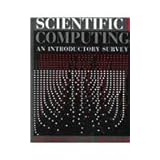Pdf Ebooks Scientific Computing An Introductory Survey
Will reading habit influence your life? Many say yes. Reading scientific computing an introductory survey is a good habit; you can develop this habit to be such interesting way. Yeah, reading habit will not only make you have any favourite activity. It will be one of guidance of your life. When reading has become a habit, you will not make it as disturbing activities or as boring activity. You can gain many benefits and importances of reading.
When coming with scientific computing an introductory survey, we feel really sure that this book can be a good material to read. Reading will be so enjoyable when you like the book. The topic and how the book is presented will influence how someone loves reading more and more. This book has that component to make many people fall in love. Even you have few minutes to spend every day to read, you can really take it as advantages.
Compared with other people, when someone always tries to set aside the time for reading, it will give finest. The result of you read scientific computing an introductory survey today will influence the day thought and future thoughts. It means that whatever gained from reading book will be long last time investment. You may not need to get experience in real condition that will spend more money, but you can take the way of reading. You can also find the real thing by reading book.
Delivering good book for the readers is kind of pleasure for us. This is why, the scientific computing an introductory survey books that we presented always the books with incredible reasons. You can take it in the type of soft file. So, you can read scientific computing an introductory survey easily from some device to maximize the technology usage. When you have decided to make this book as one of referred book, you can give some finest for not only your life but also your people around.
Scientic Computing An Introductory Survey
computing condition number denition of condition number involves matrix inverse so it is nontrivial to compute computing condition number from denition would require much more work than computing solution whose accuracy is to be assessed in practice condition number is estimated inexpensively as byproduct of solution process
Scientic Computing An Introductory Survey
scientic computing an introductory survey chapter 8 numerical integration and differentiation prof. michael t. heath department of computer science michael t. heath scientic computing 21 61. numerical integration numerical differentiation richardson extrapolation quadrature rules adaptive quadrature
Scientic Computing An Introductory Survey
scientic computing an introductory survey chapter 10 boundary value problems for ordinary differential equations prof. michael t. heath michael t. heath scientic computing 2 45. boundary value problems numerical methods for bvps boundary values existence and uniqueness conditioning and stability
Scientic Computing An Introductory Survey
scientific computing an introductory survey chapter 11 partial differential equations author prof. michael t. heath created date 5242007 82938 pm
Scientific Computing An Introductory Survey Solution ...
scientific computing an introductory survey solution manual are a good way to achieve details about operating certainproducts. many products that you buy can be obtained using instruction manuals. these user guides are clearlybuilt to give step by step information about how you ought to go ahead
Scientic Computing An Introductory Survey
optimization problems one dimensional optimization multi dimensional optimization outline 1 optimization problems 2 one dimensional optimization 3 multi dimensional optimization michael t. heath scientic computing 2 74
Scientic Computing An Introductory Survey
computing characteristic polynomial in oating point arithmetic we obtain detai 2 2 1 2 2 2 1 which has 1 as double root thus eigenvalues cannot be resolved by this method even though they are distinct in working precision michael t. heath scientic computing 11 87
Scientific Computing An Introductory Survey Chapter 11 ...
michael t. heath scientic computing 97 105. partial differential equations numerical methods for pdes sparse linear systems direct methods iterative methods comparison of methods multigrid methods continued by exploiting strengths of underlying iterative smoothers

